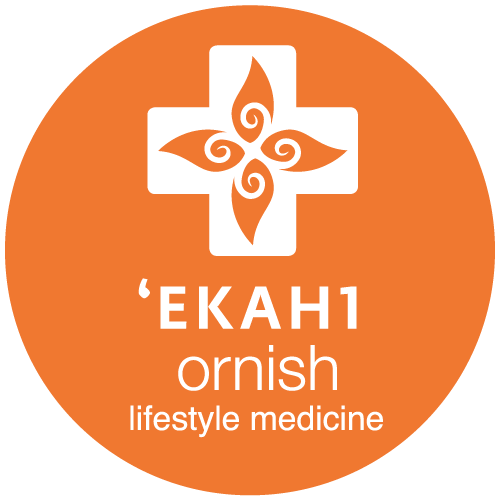
How to enroll your patients:
Admission to the program is based on eligibility criteria, limitations/exclusions, and readiness.
Do you have patients that meet criteria? Print and fax over a completed referral form:
Program Eligibility:
To determine if you’re eligible for the Ornish Program, refer to the three categories and insurance types in the table below.
Intensive Cardiac Rehab
Eligible insurance types:
- Medicare
- Medicare Advantage
- HMSA PPO/HMO
- HMSA Fed 87
Diagnosis
Select at least one (1) or more of the following diagnosis:
- Post MI- Within the past 12 months
- Less than eight weeks:
- Anterolateral wall (410.02)
- Other anterior wall (410.12)
- Inferolateral wall (410.22)
- Inferoposterior wall (410.32)
- Of other inferior wall (410.42)
- Of other lateral wall (410.5)
- True posterior wall infarction (410.62)
- Subendocardial infarction (410.72)
- Of other specified sites (410.82)
- Unspecified site (410.92)
- More than eight weeks (412)
- Cardiac Surgery/Procedures
- Heart transplant (V42.1)
- Valve (V43.3)
- CABG vessel(s) (V45.81)
- Post coronary angioplasty (V45.82)
- Heart valve includes “porcine” or mention of other homologous or heterologous tissue (V42.2)
- Stable angina (413.9)
Expanded Cardiac Diagnoses
Eligible insurance types:
- HMSA PPO/HMO
Diagnosis
Select at least one (1) or more of the following diagnosis:
- Diagnosed with coronary artery disease (CAD) based on cardiac catheterization or non-invasive testing such as exercise testing, nuclear imaging, echocardiogram, or other test that clearly demonstrates ischemia
- Eligible for bypass surgery or percutaneous transluminal coronary angioplasty (PTCA) but seeking a clinical alternative;
- Diagnosed with congestive heart failure (CHF)
- Diagnosis of metabolic syndrome, defined as any three of the following;
- Abdominal obesity (waist greater than 40 inches for men, greater than 35 inches for women).
- Triglycerides greater than150 mg/dL.
- Taking medication for low HDL or HDL less than 40 mg/dL for men, less than 50 mg/dL for women.
- Blood pressure greater than or equal to 130/85 mmHg, or taking anti-hypertensive medication.
- Fasting blood sugar greater than or equal to 100 mg/d
Cardiac Risk Factors
Eligible insurance types:
- HMSA PPO/HMO
Risk Factors
Select at least two (2) or more of the following Risk Factors:
- Family or personal history of CHD: First-degree relative (i.e. parents, full siblings).
- Age (males over 45, females over 55).
- History of tobacco use but current tobacco non-user for at least two months.
- Hypertension: Blood pressure greater than 130/85 mmHg or taking anti-hypertensive medication.
- Low HDL-C: Less than 40 mg/dL or on medications for lipid therapy.
- Elevated lipoprotein: Lp (a) greater than 30 mg/dL or on medications for elevated lipids.
- Total cholesterol greater than 200 or on medications for elevated lipids.
- LDL greater than 100 or on medications for elevated lipids.
- High-sensitivity C-reactive protein greater than 3 mg/dL and less than 10 mg/dL.
- Obesity, defined as one of the following:
- BMI greater than 30.
- Waist to hip ratio greater than or equal to 1.0 for men; greater than or equal to 0.85 for women.
- Waist circumference (greater than 40 inches for men, greater than 5 inches for women).
Limitations/exclusions:
Prospective participants should be motivated to complete the program and make the necessary lifestyle changes. Before being accepted, they must go through a preliminary screening process provided by the accredited Ornish Reversal Program delivery site to ensure that they’re sufficiently motivated and meet the eligibility criteria. Participants must be nonsmokers or have quit smoking at least two months before starting the program. Acceptance into the program is at the sole discretion of the Ornish Reversal Program delivery site. Ornish Program delivery sites may not be available in all areas of Hawaii.
Readiness:
Precertification isn’t required to enroll in the program. However, the Ornish Reversal Program delivery site will screen patients for readiness to make an intensive lifestyle change.
After admission:
The provider continues to manage the patient’s care plan during the term of the program and leverages the provider-patient relationship to support the intensive lifestyle changes required by the program. Participants in the Ornish Reversal Program must continue to actively work with their referring provider to make appropriate adjustments to care plans as their chronic conditions improve. This includes office visits to manage medical conditions, medication adjustments, and any testing required to measure program outcomes. The Ornish Reversal Program nurse case manager works with the referring provider and the patient to facilitate this process.
Additional Program Information
The Ornish Reversal Program is proven to not just prevent but reverse heart disease by over 25 peer reviewed journals.
Need more proof of why this program works?
Check out the Scientific Foundation of Ornish Lifestyle Medicine
15 – Delivered to cohorts of up to 15 participants
9 – Length of the program is 9 weeks
2 – Sessions 2 times a week
4 – The intensive lifestyle modification is based on 4 elements
Each session is 4 hours with 1 hour being spent on each element
1 referral activates a team of health experts to enhance your effectiveness, efficiency, and profitability, while improving patient outcomes.
“Most people feel so much better, so quickly, it reframes the reason for changing- from fear of dying to joy of living- which makes it sustainable.”
– Dr. Dean Ornish
Potential health benefits of program participation include: 1-14
- Reduce risk of cardiac events and their reoccurrence
- Regression of coronary artery stenosis
- Significantly greater exercise capacity
- Improvements in LDL cholesterol, BMI, blood pressure, and fasting blood glucose
- Decrease frequency and severity of angina
- Decreased size and severity of myocardial perfusion abnormalities
For more information call (808) 777-4001 or visit www.ekahiornish.com/ohana or https://www.ornish.com/undo-it/
References
- Ornish D, Scherwitz LW, Billings JH, et al. Intensive lifestyle changes for reversal of coronary heart disease. JAMA. 1998;280:2001-2007.
- Ornish D, Brown SE, Scherwitz LW, et al. Can lifestyle changes reverse coronary heart disease? The Lifestyle Heart Trial. Lancet. 1990;336:129-133.
- Ornish D, Scherwitz LW, Doody RS, et al. Effects of stress management training and dietary changes in treating ischemic heart disease. JAMA. 1983;249:54-59.
- Ornish D. Avoiding revascularization with lifestyle changes: The Multicenter Lifestyle Demonstration Project. Am J Cardiol. 1998;82:72T-76T.
- Gould KL, Ornish D, Scherwitz L, et al. Changes in myocardial perfusion abnormalities by positron emission tomography after long-term, intense risk factor modification. JAMA. 1995;274:894-901.
- Gould KL, Ornish D, Kirkeeide R, et al. Improved stenosis geometry by quantitative coronary arteriography after vigorous risk factor modification. Am J Cardiol. 1992;69:845-853.
- Silberman A, Banthia R, Estay IS, et al. The effectiveness and efficacy of an intensive cardiac rehabilitation program in 24 sites. Am J Health Promot. 2010;24:260-266.
- Daubenmier JJ, Weidner G, Sumner MD, et al. The contribution of changes in diet, exercise, and stress management to changes in coronary risk in women and men in the Multisite Cardiac Lifestyle Intervention Program. Ann Behav Med. 2007;33:57-68.
- Frattaroli J, Weidner G, Merritt-Worden TA, et al. Angina pectoris and atherosclerotic risk factors in the Multisite Cardiac Lifestyle Intervention Program. Am J Cardiol. 2008;101:911-918.
- Koertge J, Weidner G, Elliott-Eller M, et al. Improvement in medical risk factors and quality of life in women and men with coronary artery disease in the Multicenter Lifestyle Demonstration Project. Am J Cardiol. 2003;91:1316-1322.
- Merritt T, Scherwitz L, Brown S, et al. Changes in lifestyle and exercise capacity. J Cardiopulmonary Rehab. 1990;10:354.
- Pischke C, Scherwitz L, Weidner G, et al. Long-term effects of lifestyle changes on well-being and cardiac variables among coronary heart disease patients. Health Psychology. 2008;27:584-592.
- Pischke CR, Weidner G, Elliott-Eller M, et al. Lifestyle changes and clinical profile in coronary heart disease patients with an ejection fraction of =40% or >40% in the Multicenter Lifestyle Demonstration Project. Eur J Heart Failure. 2007;9:928-934.
- Ornish D. Concise review: Intensive lifestyle changes in the management of coronary heart disease. In: Braunwald E, ed. Harrison’s Principles of Internal Medicine (online). New York, NY: McGraw Hill; 2002.

